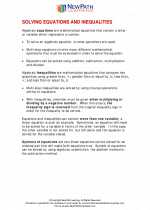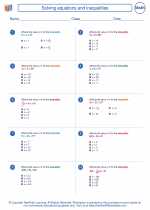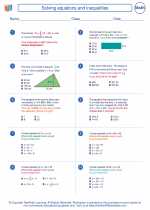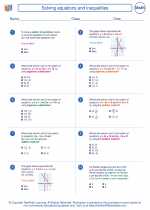Whole Numbers
Whole numbers are the set of numbers that include all the natural numbers (1, 2, 3, 4, ...) and zero (0). These numbers are used to represent quantities or counts of items. Whole numbers are used in various mathematical operations such as addition, subtraction, multiplication, and division.
Properties of Whole Numbers
- Closure Property: The sum and product of any two whole numbers is always a whole number. For example, 3 + 4 = 7 and 3 * 4 = 12.
- Associative Property: The grouping of whole numbers does not affect the result of addition and multiplication. For example, (2 + 3) + 4 = 2 + (3 + 4) and (2 * 3) * 4 = 2 * (3 * 4).
- Commutative Property: The order of whole numbers does not affect the result of addition and multiplication. For example, 2 + 5 = 5 + 2 and 2 * 5 = 5 * 2.
- Identity Property: The sum of any whole number and zero is the whole number itself. For example, 6 + 0 = 6. The product of any whole number and 1 is the whole number itself. For example, 6 * 1 = 6.
- Distributive Property: The product of a whole number with the sum of two other whole numbers is equal to the sum of the products of the whole number with each of the other whole numbers. For example, 2 * (3 + 4) = (2 * 3) + (2 * 4).
Operations with Whole Numbers
Whole numbers can be used in various mathematical operations:
- Addition: Adding two or more whole numbers together.
- Subtraction: Finding the difference between two whole numbers.
- Multiplication: Finding the product of two or more whole numbers.
- Division: Finding the quotient of two whole numbers, with or without remainders.
Study Guide
To master the concept of whole numbers, it is important to practice the following:
- Practice identifying whole numbers and understanding their properties.
- Practice performing addition, subtraction, multiplication, and division operations with whole numbers.
- Work on word problems that involve whole numbers to apply the concepts to real-life situations.
- Understand the properties of whole numbers and how they apply to different mathematical operations.
By mastering these skills, you will have a solid understanding of whole numbers and be able to apply them in various mathematical contexts.
.◂Math Worksheets and Study Guides Eighth Grade. Solving equations and inequalities
Study Guide Solving equations and inequalities
Solving equations and inequalities  Worksheet/Answer key
Worksheet/Answer key Solving equations and inequalities
Solving equations and inequalities  Worksheet/Answer key
Worksheet/Answer key Solving equations and inequalities
Solving equations and inequalities  Worksheet/Answer key
Worksheet/Answer key Solving equations and inequalities
Solving equations and inequalities 

 Worksheet/Answer key
Worksheet/Answer key
 Worksheet/Answer key
Worksheet/Answer key
 Worksheet/Answer key
Worksheet/Answer key

The resources above cover the following skills:
Algebra (NCTM)
Represent and analyze mathematical situations and structures using algebraic symbols.
Develop an initial conceptual understanding of different uses of variables.